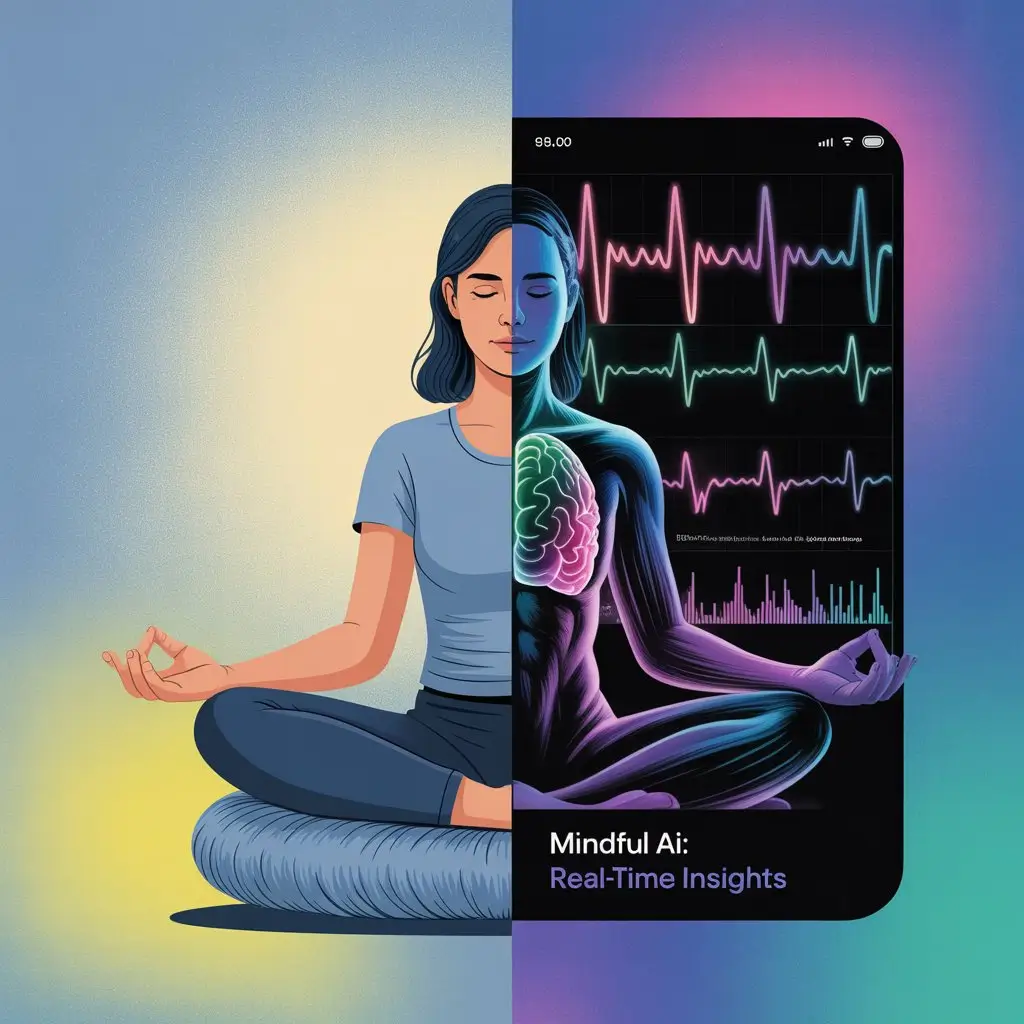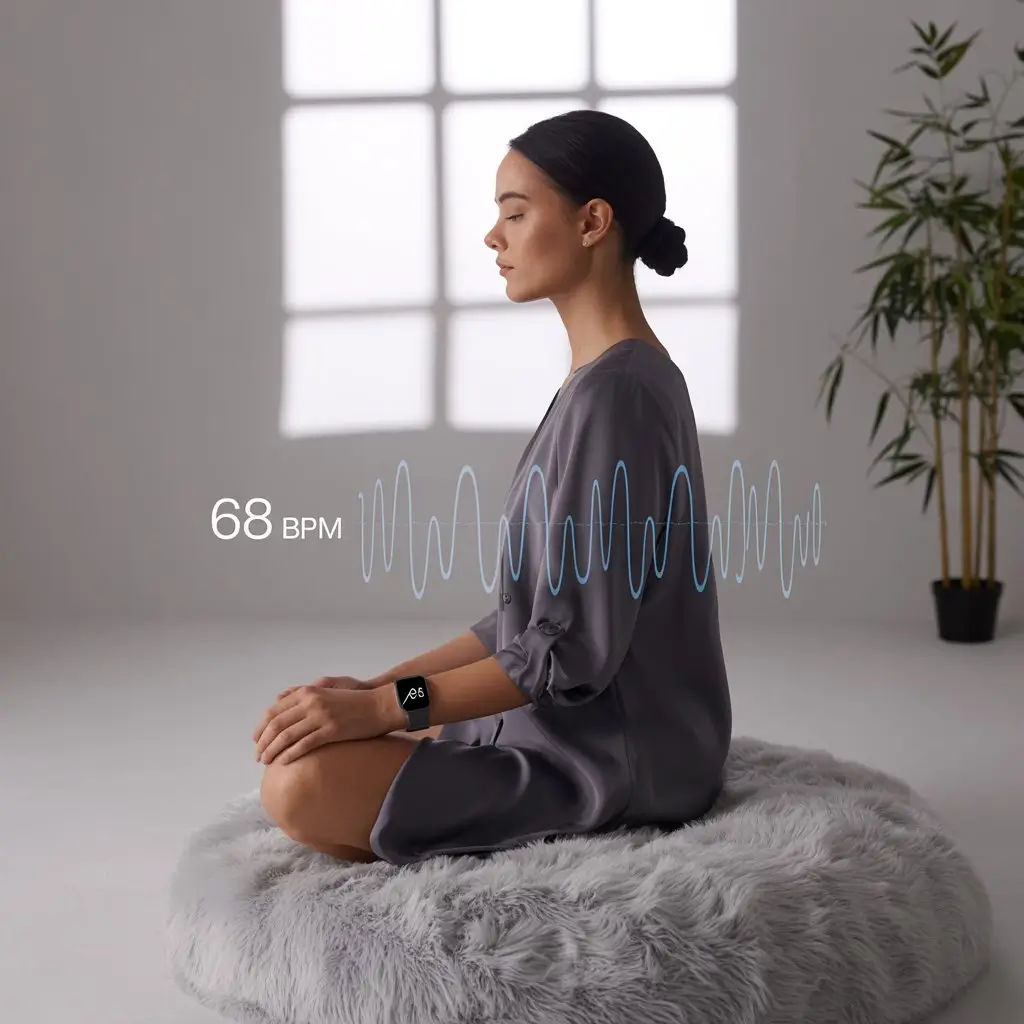Meditation has gained popularity as a means through which most individuals seek peace and relaxation in their stressful daily careers. Meditation traditionally implies sitting down to silence the mind and pay attention to the present, but it is not always clear how to begin doing it and remain motivated. The modern invention of artificial intelligence (AI) is now transforming the practice of meditation, which will become even more individual and easy to adhere to. With AI, meditation apps and tools may become capable of learning our moods, likes, dislikes and progress to provide us with guidance specific to our individual and unique needs. The paper will discuss how AI transforms the meditation process, making it accessible and modern to more people.
AI and Meditation: The Point of Intersection
The so-called artificial intelligence, or AI, is a computer system that can learn, change, and carry out tasks that typically involve human thought. Regarding meditation, AI employs machine learning and sensors to know how individuals meditate and what they should do to enhance their meditation. Conventional meditation may sometimes be challenging because it may need discipline and self-reflectivity, which may be hard to come by through personal efforts. The support that AI can provide is stereotyped to specific habits and feelings of a particular person.
For example, AI can examine the information about your meditation practice, including the duration of meditations or the level of collected calmness, and tell you how to improve your practice. It can also be used to measure your heart rate or breathing so it knows when you might need additional assistance or a different mode of meditation. This technology, along with mindfulness, is a new form of connecting people with meditation in a way that suits their lifestyle and will keep them motivated. In the following sections, we will consider how AI can help to make meditation more personal, offer feedback in real-time, and even play the role of a virtual coach to help your mindfulness practice.
AI-Driven Personal Guided Meditations
The fact that AI is making meditation personal is one of the most significant changes it can bring. No two personalities are the same, and something another person likes to relax with may not work in your case either. AI will be able to learn your moods, habits and how you react to various meditations. It uses this information to plan guided meditation that best suits you.
Suppose you are anxious; in that case, AI could recommend relaxing exercises with certain breathing techniques or mindfulness. If you are more concerned with achieving sound sleep, it might recommend meditations that you can do before you go to sleep so that you relax. The individualized style would also make meditation truly fascinating and productive, and maintaining the same practice regularly would be less difficult.
A lot of meditation apps have lately incorporated AI into their programming to change the duration, accents, and forms of meditation according to your activity and responses. This means that you will be provided with a customized experience with each visit and not a one-fits-all session. AI allows you to customize your meditation, thus making the practice friendlier and easier for everyone to master.

Biometric and Emotional 24/7 Feedback
Another thrilling aspect of AI-enhancing meditation is real-time feedback based on bio-data and emotions. Smartwatches and even headbands can detect the rate of your heart, your breathing, and even your brain activity when you are meditating. AI reads through this data immediately to determine what is happening within your body and mind.
In this case, suppose that your heart is beating rapidly or you are breathing at shallow rates; the AI may advise slow breathing or change your meditation method to ensure that you are relaxed in a better position. There are even applications that sense when your thoughts are drifting and promptly help you get your thoughts focused back once again, without breaking the continuity of your practice.
This in-time feedback enhances meditation’s interaction and efficiency. Rather than blindly trying to figure out whether or not you are doing well, you receive clear and individual feedback that simply helps you keep your head in order. In the long run, this may result in enhanced mindfulness, less stressful situations, and healthier well-being.
Meditation via Artificial Intelligence Content creation
Meditation content creation using AI is also changing. Historically, meditation teachers or other professionals make recordings of their guided meditations and audio sessions, which requires time and constrains the resources available. This means that now AI can do the work of creating meditation scripts, relaxing music, and guided meditations automatically and thus more readily come up with new and different meditations.
To illustrate, AI can generate customized meditation stories or imaginations, depending on what you want to hear or see. Make tranquillizing background music that relaxes you or concentrates on it. This technology enables people to do meditation more freely without needing hours of recording or editing.
AI contributes to the expansion of meditation globally as it makes the process of content creation quicker and not limited by time. You may be looking to do a 5-minute breathing exercise or a deep relaxation session—what is important is getting the correct content when you need it.
Virtual Mindfulness Coach as AI
Artificial intelligence does more than produce content and monitor your progress; it even periodically pops up as a virtual coach to assist in your meditation. These AI-based coaches can be accessed at any time and provide some signals of inspiration, motivation, and advice on being consistent with your practice.
Beginners can start with basic meditation exercises explained by the AI coach and recommended practices. Veteran meditators can suggest new methodologies or change your sessions depending on your mood and improvement. Other AI coaches can also provide conversational functionality so you can discuss your issues or emotions and get a heartfelt response that would help you keep your mind on track toward the goals.
Personalized assistance, as well as the feeling that meditation is a more interactive practice that the help of AI coaches can enhance, facilitates the development of a routine. They also contribute to the mediation between traditional meditation courses and individual practice, where the assistant is not only friendly but can suit your needs at any time of the day one wants. This strategy assists an increasing number of people in enjoying the fruits of mindfulness in their lives.
Novation is proving to be a fresh gateway for users and teachers in the meditation fraternity.

Neuroscience and Artificial Intelligence(AI) powered Meditation Knowledge
Artificial intelligence will also assist us in closing the gap on how meditation works in the brain and body. With brain scans, heart rate monitors, and other sensors, AI can give answers to the question of how meditation techniques alter brain activity and positively affect mental health.
For example, AI may monitor changes in attention, anxiety levels, or emotional control and determine that meditation is physiologically effective and through brain activity patterns. This scientific understanding makes meditation practices more narrowed down, to be precise.
In addition, this knowledge can be employed in creating meditation programs that will effectively reinforce certain aspects of brain functionality or understand how to maintain mental well-being in an individualized fashion through AI. In this combination of neuroscience and AI, new opportunities are becoming available to optimize the meditation process to characterize the relaxation habit as an effective mental health enhancement and personal growth method.
Moral and Logistic Reasons
Even as AI presents some thrilling possibilities for meditation, it has some significant ethical and practical concerns. Privacy is one of the serious issues. As AI gathers sensitive information such as heart rates, brain activity, emotional states, etc., it is important to make sure that this information is stored safely and used responsibly. There ought to be transparency in what users do with their data and its applications.
The second is the compromise between the newer, technologically advanced world and the ancient values of meditation. To some extent, meditation is all about being in the moment and not thinking about anything besides distractions, but overusing AI tools may induce a level of dependency or hinder the personal aspect and self-reflection of meditation. You should not think of AI as a replacement for inner awareness but as a friendly assistant.
Moreover, AI systems can be biased according to the bias in the data that they are trained and, therefore, may negatively influence the quality of serving different groups of humans. Software creators should be more diligent in ensuring drug-free meditation concepts are all-inclusive.
With reasonable solutions to these challenges, we can take advantage of AI’s positive effects on meditation without intruding on privacy, tradition, and fairness.
New Directions and Creations
AI will continue to influence the future of meditation in thrilling ways as we advance into the year 2025 and beyond. The most significant new trend is the widespread uptick of highly customizable, even bespoke, meditation apps, which respond to your state of mind, ambitions, and even your physiology, such as your heart rate or stress levels. Such intelligent applications can tell when you may require a situation of relaxation and present corresponding workouts whenever demanded, explaining why mindfulness can be integrated much more easily into active, contemporary lifestyles16.
Another helpful tool is Virtual Reality (VR), which develops immersive situations that take the user to a calm place, enhancing the relaxation process and concentration. Without being limited to combinations of content, VR meditation experiences can be tuned in dynamic difficulty based on your mood and taste1 plus AI. Meditation programs powered by AI are part of corporate wellness programs that are being introduced into workplaces. Such programs can tailor stress management applications, real-time feedback, and evidence-based information to assist workers and managers in creating healthier, more productive cultures5.
In the future, AI meditation will become even more interactive and empathetic, being a new version of a personal coach in your pocket, which is aware of your emotional needs and continues to assist you. Nevertheless, it must be borne in mind that, in the evolution of such technologies, a balance between the application of AI and the human aspect of connection needs to be maintained to ensure that meditation remains a very intimate and heartfelt practice4.
On the whole, the future of meditation is the combination of the ancient tradition of mindfulness wisdom with the newest technology of AI, and thus, meditation will become more accessible, productive, and capable of adapting to all people.
Conclusion
Artificial intelligence is slowly evolving meditation practice in a compelling and stimulating manner. AI enables individuals of any experience level to create and develop mindfulness practices that suit their needs by providing personalized guidance, real-time feedback, and simple access to a high level of diversity in meditation content. The effect of this technology also expands our knowledge of the impacts of meditation on the brain and body and creates more avenues of mental well-being.
Simultaneously, we want to strike a balance between these innovations and privacy, ethical treatment of information, and the very nature of meditation as an individual, inward experience. In the future, it is safe to expect that AI and meditation will also expand into each other to combine ancient knowledge and cutting-edge technology to provide mindfulness to everyone as effectively as possible.
We are fortunate to adopt these new tools, as we can use them to introduce some tranquillity and clarity to our hectic lives and make our lives grounded and more pace-friendly in a rushed world.

